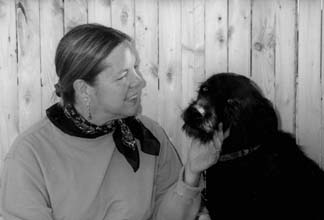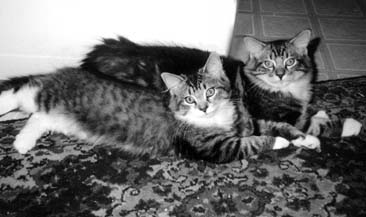The incidence of cancer in domestic animals has risen dramatically in the past several years, especially in dogs and cats. Some 70 types of cancers have been identified—one reputable source indicates that 47 percent of dogs over 10 years of age now die of cancer. No one cause has been attributed to this rise, however, several factors have been implicated. These include increasing longevity, diet, environmental factors, high levels of stress, some vaccines, genetics (overbreeding), viruses, and more.
Based on this rise in incidence, more attention is being paid to this disease, not just in the United States, but in many other countries. Not only can animals receive conventional, Western medical treatments—surgery, radiation, and chemotherapy—but they can benefit from a number of alternative or holistic therapies to treat the cancers they develop. A variety of treatments are now available to treat cancers in dogs and cats (and even in rabbits and ferrets), ranging from traditional surgery to laser surgery to experimental radiation techniques like brachytherapy, to alternative, less invasive treatments including acupuncture, herbs, homeopathy, naturopathy, Bach flower remedies, and others. Most of these therapies do not claim to cure the cancer, but, rather to palliate the condition, while improving and lengthening the life of the animal patient. Some animals receive no conventional treatments and survive quite a long time.

My husband and I lost four greatly loved animals to various types of cancer in a fifteen-year period. Annie died of feline leukemia (which led to a cancer at the end), Misty of mammary cancer, Puck of a rare (but dramatically increasing) vaccine-induced fibrosarcoma, and Bauhaus, a yellow Lab-mix dog, of a mast cell tumor. Annie and Misty lived to be 18 or so, Bauhaus to 12, but Puck only lived to eight. She didn’t even reach half her expected lifespan. Until the cancer hit her, she hadn’t even started to slow down.
I decided to try to discover why our animals had died and if we were alone in our experience. During my research journey, I discovered so much I had only previously suspected. Almost everyone I spoke with—friends, colleagues, relatives, and doctors—had at least one animal cancer story to tell. Near strangers called or wrote me with grueling or heart-warming stories. I learned a pronouncement of cancer is not always a death sentence. The odds for survival or a substantial remission have improved somewhat because of an increasing awareness of the problem and because of all the available options.
A growing number of veterinarians and other animal caregivers around the world, particularly in France, the United Kingdom, Norway, and Australia, as well as in the United States and Canada, now practice complementary medicine — "alternative" mixed with conventional methods-treating the whole animal, not just the disease. This philosophy seems to work well when applied to the treatment of cancer. Doctors like George Glanzberg, V.M.D., of North Bennington, and Donna Raditic, D.V.M., of Great Barrington, Massachusetts, are doing wonderful, often innovative work on behalf of the animals who receive their loving and knowledgeable attention. They look at each animal as an individual, considering her lifestyle, emotions, diet and activities. These animals often come to the veterinarians’ clinics in their last weeks or days.
Prevention or early detection is critical. We humans can do much more to prevent many animal cancers. We can feed our animals more nutritious, natural diets (what’s contained in most commercial pet food is truly shocking), provide more vitamins, supplements, and herbs, reconsider the necessity and frequency of vaccinations, and thoughtfully weigh the use of pesticides, some toys, cat litters, and other items. The cleaning products we use, the chewies we buy for our dogs and cats, and even the material that make up their food dishes count in assessing the risks to their health and happiness. The amount of time we spend with them and how closely we listen to what they have to tell us also matter.
As our lives become more stressed, so do those of our animals. We can lower the stress level of our pets while lowering our own. If we walk and play more, we all will feel better. We need to touch our animals more, and we need to become more skillful human-animal communicators. Animals have so much to teach us.

I believe we need to consider redefining the term "success" in the cancer arena. Veterinarians and other health care practitioners can not always "cure" cancers, but they can palliate and treat the symptoms. With lifestyle changes, our animals can live longer lives, in less pain. And we can learn that, as opposed to the popular definition of the word which implies a long-term, permanent cure, success in this case may mean something quite different—less pain, more joy, and learning to know when it is time to let go.
As a result of my experiences and my extensive research, I have written a book about this complex topic. Why is Cancer Killing Our Pets? How You Can Protect and Treat Your Animal Companion will be published by Healing Arts Press (Rochester, VT) in November. And, on a more personal note, as a result of my extensive research, my husband and I have changed the lifestyles of our three animals—Wanda, The Bearded Lady (a mixed-breed black dog), and Bruno and Stella, brother and sister Maine Coon cats. They benefit from the tragic losses of Annie, Misty, Puck, and Bauhaus. I hope my book will help other animal lovers and provide useful, perhaps life-saving information that I could not readily find when our four animal companions were dying.
Deborah Straw is a writer and teacher who lives in Burlington. In addition to Why is Cancer Killing Our Pets, How You Can Protect and Treat Your Animal Companion , she has written Natural Wonders of the Florida Keys, an ecotourism guide published by Country Roads Press/NTC Contemporary Publishing in 1999.
Cover
Other issues
Editorial mission
Information for advertisers
Links
Directory
Calendar
Submission guidelines
Suggestions? Send us email